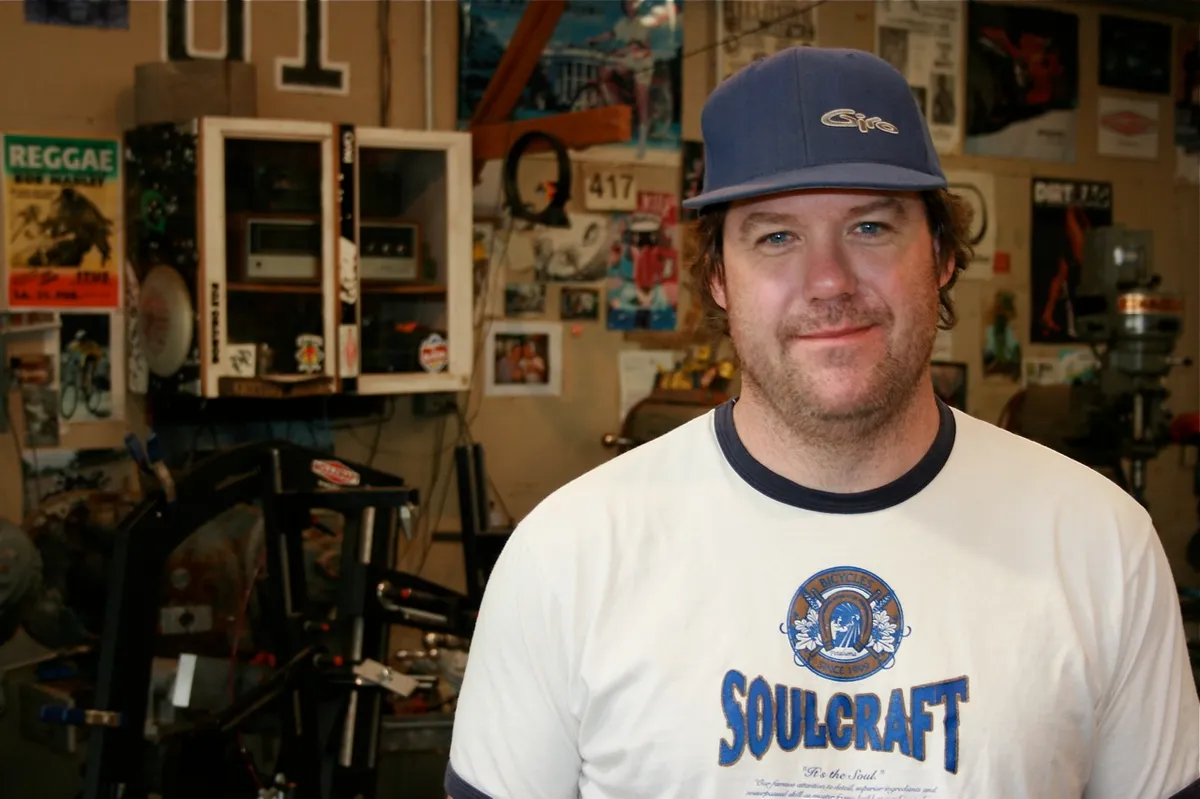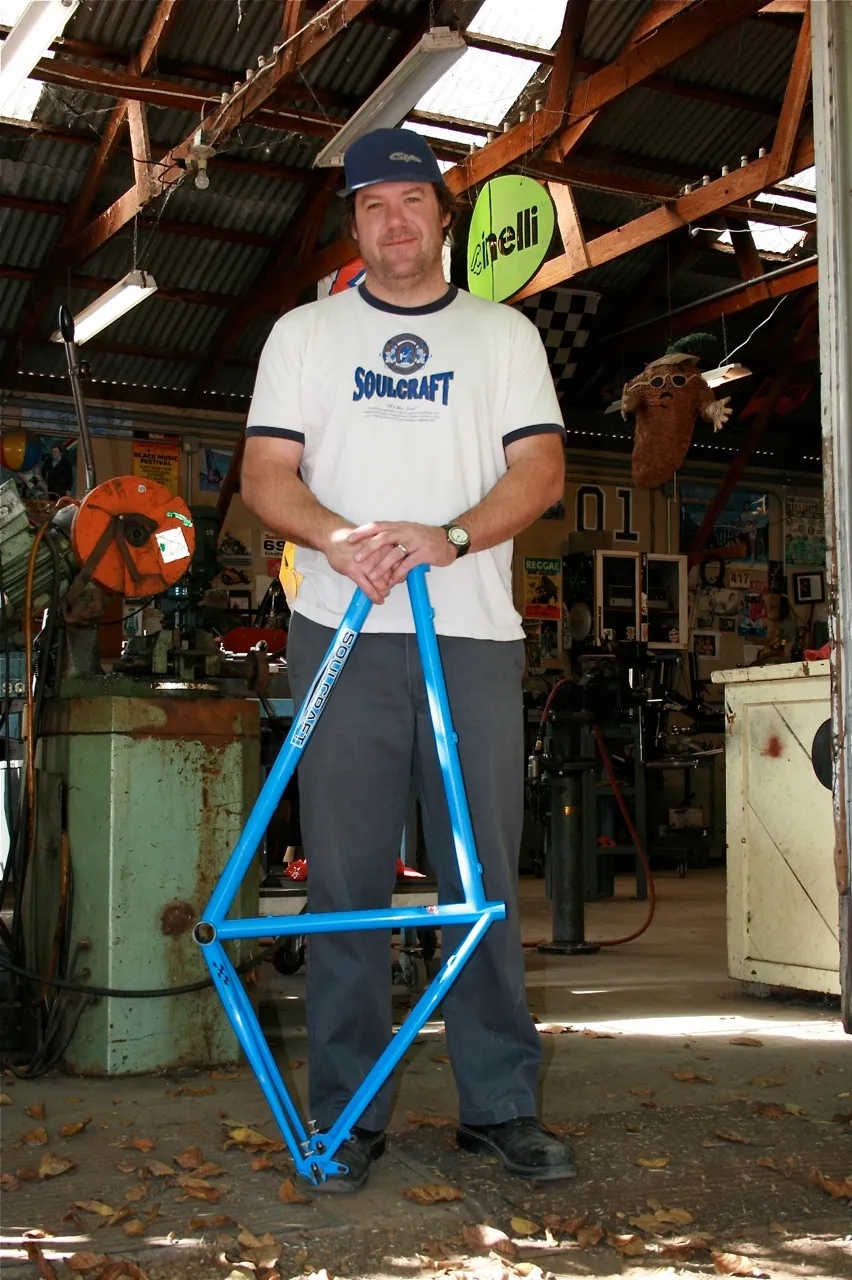Growing up in San Rafael, California, Sean Walling was inspired by Schwinn StingRay choppers and, later, Redline BMX bikes to become a master framebuilder. But it took the influence of some now-famous bike industry folks to gain the knowledge needed to set out on his own in 1999.
Nestled in a small workshop on a farm in Petaluma, Sonoma County, just north-east of his earlier stomping grounds, Walling builds custom steel mountain, road, cyclo-cross, 29er and singlespeed frames with his Selectron tubing under the Soulcraft label.
BikeRadar spent a sunny autumn day with the 39-year-old to learn more about his future plans, career path and his time spent at renowned bike maker Salsa.
BikeRadar: What direction do you see Soulcraft heading in during the next year or two?
Sean Walling: Custom frames are the core of Soulcraft, and I'd like to add transportation bikes to the mix. Not custom, per se, but giving the customers what they want, and they're asking for transportation and commuter bikes. I'm hearing it from my framebuilding buddies as well, so there's definitely a trend emerging. I didn't think people would spend the money on a handmade commuter bike, but that's all changing. Integrated racks, belt drives, internal gearing – interest is slowly building, and folks are looking to buy locally. There's a brewing nationalistic mood in our country right now, and I'm in total agreement.
The bike that's going to save the world isn't a US$3,000-$5,000 commuter, it's the $400-$1,000 commuter. But I can't build anything complete for under $3,000. I could hire somebody to work on those bikes... [but] even if I could get the cost down to, say, $2,500, am I making more money? Most likely not ... [and] now I have employees and all the headaches that come with that. That leaves outsourcing/offshoring. That's a whole other deal that involves personal and ethical values. I know I could make money doing it, but is that the way I want to do it?
One thing I've been thinking about is opening a bike shop as part of my framebuilding business, like the European model. If I already had a person in the shop selling other stuff and doing repairs, they might be able to handle dealing with the assembly and order filling on these commuting bikes, so it's still a possibility.
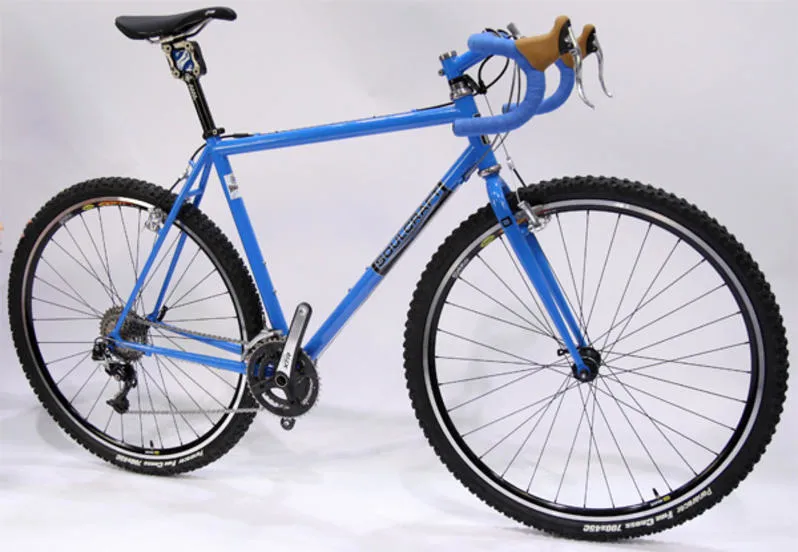
I have a few orders for bikes that I know will be used for mostly commuting. But these guys don't want to commit to the full "pegged pant leg" deal so they are getting our 'cross bikes (either the Dirt Bomb or Groundskeeper) and adding all the braze-on options. That way, they can take off the racks and fenders and still use them as 'cross bikes. No internal hubs or drum brakes. The differences between all these niche bikes is often no more than additional braze-ons and different handlebars. People make way too much of terms like commuter and 'cross, etc.
You talked about an idea to open a boutique bike shop, Euro style. Where might that be – in Petaluma?
I recently visited Steve Rex's shop in Sacramento for the fundraiser his friends put on and was totally inspired by his shop. It's what I've been dreaming of doing for a long time: a mix of retail/repair and frame building. I don't have much free time these days so I'd have to hire someone to help run the retail and repair part. I have no interest carrying big lines so it would be mostly parts and accessories. Steve carries some other frame brands that don't conflict with his own, which I think makes a lot of sense.
It scares the crap out of me when I see shops under so much pressure to sell all of last year's stuff before the new stuff arrives, discounting everything just to keep up. I would try to grow it more organically and concentrate on having a really good mechanic and parts and accessories that people need, rather than trying to push them to be "consumers" and constantly upgrading just because something new came out. Basically, be more of a refuge for people who want solid info and products based on what we use, rather than what companies and reps are pushing.
As far as location, Petaluma is my first choice. Petaluma has two shops already but neither doing it the way that I would, or with a framebuilder attached. I already have a shop which I use for building my frames, so I can simply hire someone to do repairs at first. Getting the word out that we're offering this service would be fairly easy. If no one shows up, no biggie. My employee goes away and I don't have a big investment in a space or parts/bikes. If it works, we grow as needed.
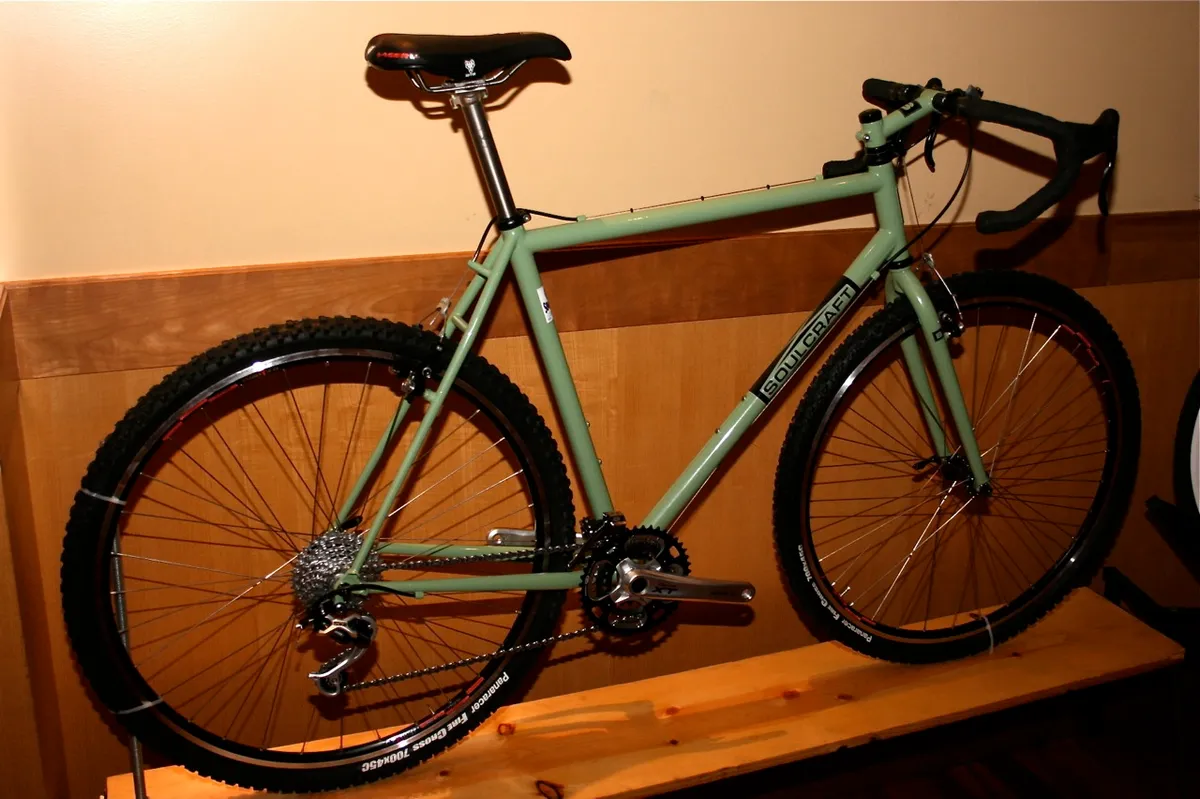
How about Soulcraft's small parts selection?
We originally started doing our Convert chain tensioner before others realised there was a broad market. Ours is made locally, and it caught on. Quality Bicycle Products (QBP) and other distributors carry it, and I can foresee Soulcraft expanding its accessory and small parts business.
I'm always thinking of little things. The world doesn't need another stem or tyre or riser bar. I'm talking something that would address what people need rather than, "Hey, we can put our logo on that and sell it". I have to keep them a secret though because it takes me forever to get these things done. If I tell you what they are, some guy with a credit card and an atom splitter will beat me to the punch (laughs)!
How did you get involved with bikes in the first place?
I started riding when I was three, growing up in San Rafael, and remember realising that riding was my thing, an adventure. As time went on I knew it was an escape vehicle. There was a wave of kids my age then, and we were always riding bikes, like a rolling gang. Dirt-bike riding was the term for riding our Schwinn StingRays on dirt trails and jumps. There were no BMX tracks in our town, so we created our own fun after school.
Three of my friends were brothers. One had a paper route, and showed me a copy of BMX Plus magazine, which was my second life-changing moment! He was researching what to buy – a Redline MX-2. When he got that, my StingRay was no longer cool. I didn't have a paper route then (in the late 1970s). I could only afford used and re-welded bikes, which I'd tinker with.
The owner of Redline took welding machines to Japan and taught bike builders how to do it, when most American brands were made in California (like Race Incorporated, GT, etc.). Outsourcing bikes began before the heyday of BMX and mountain bikes, and the founder of Redline was part of it.
Tell us about your career path leading up to Salsa...
I started working on my own bikes after I read a tech tip in BMX Plus about turning a coaster brake hub into a freewheel. Then I asked for a job at Fargo Bikes in Terra Linda when I was in high school. My experience with geared bikes was limited, and I was already racing BMX. I'd ride straight over from school to the shop. The owner was a businessman, not a cyclist. He was demanding, which we took as mean (laughs)! He treated me well, and I enjoyed working there. I learned a lot about customer service in a straightforward way – he wasn't one to think the customer was always right!
I attended junior college in San Luis Obispo, down the central coast of California, and checked out Broad Street Bikes. I asked if they needed a hand, and started working there immediately. I remember reading the American framebuilder's edition of Bicycle Guide magazine, with Albert Eisentraut on the cover in 1987. They featured Tom Ritchey, Bill Davidson, Dave Tesch and Bruce Gordon. I was taking welding courses because a high school counsellor advised me to work with my hands. The more I read the article, the more I realised I knew what I wanted to do for a living. School wasn't doing it for me.
I went home to San Rafael on summer break after a year in SLO and got a job at the Village Pedaler in Marin. We were selling Jeffrey Richmond frames, who I think was building frames for Gary Fisher as the time. I had a repaired frame that needed painting, and called around to find out who painted Jeff's frames. That's how I met Bruce Gordon.

Petaluma soul brothers Bruce Gordon (left) and Sean Walling
I asked Bruce if he needed a hand, and he said yes. Bruce started me out powder coating and had me work on the Rock N Road bikes, which I think was the earliest 29er. He built himself two models and had local hero Joe Murray (Gary Fisher racer, Kona and VooDoo co-founder) help design the tyres. (Merlin co-founder) Gary Helfrich did some TIG welding for Bruce at the time and Wes Williams, who was working at Ibis then, would stop by and hang out. It was quite a trip having these guys at Bruce's place.
But, my job was to finish file dropouts – tonnes that Bruce would braze for me. He was always telling me about the incredible employees he had before me, raising the bar for my output. I learned a lot about being an employee and how to be an employer, all starting with sweeping the floors. I worked for Bruce for 18 months, doing tube mitring, sales, frame alignment, finish filing, powder coating – whatever needed to be done.
Bruce was powder coating stems and things for Salsa, which was down the street at the time. I was intrigued by Salsa's infrastructure, and the fact they were doing stuff I wanted to do. After months of Salsa asking me to come over, they asked me to run their in-house powder coating system. I worked at Salsa for nearly 10 years, from 1990 until 1999. By then I was the main framebuilder, having shared duties with Brian Adams, a guy from England, and I did most of the brazing, alignment, and machining. We'd switch between making the money-making stems and frames. Our biggest cash cow was the Salsa quick-release skewers. We'd crank the binder bolts out by the thousands; I've probably made more than any framebuilder alive.
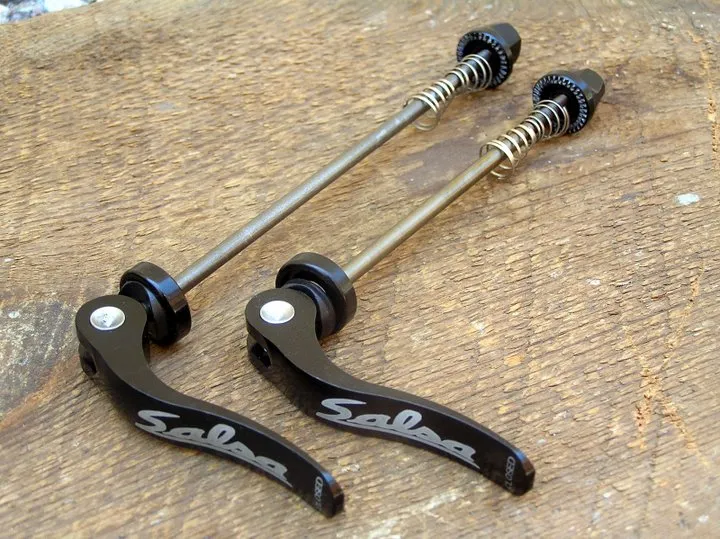
Tell us about the day you and Matt Nyiri decided to launch Soulcraft ...
Matt worked at Ibis in Sebastopol [a nearby town in Sonoma County, California] before he became sales manager at Salsa. We'd talk now and then about starting our own thing, but we realised we had a good thing at Salsa. Ross Shafer sold Salsa to QBP in 1998, and by the next summer he wanted out. Allan Hermansen, our general manager, called us all into the office to show us a fax from QBP basically letting us know they were changing things. Three options were presented: 1) keep losing money and keep things as they were; 2) employee ownership; and 3) shut everything down and go our separate ways. I looked up at Matt and nodded – we knew an opportunity was presenting itself.
The remaining Salsa employees and I met with Steve to discuss our options. I told Steve we wanted option three, but we wanted to change the date of closing things down (originally set for November) and getting our severance pay. We wanted the date bumped earlier so some folks could go to Interbike and look for jobs. We also wanted first crack at buying the machines in the shop.
Steve hemmed and hawed a bit, but we pushed for him to make a decision then and there, which was a ballsy move (laughs)! Steve is a big player in the industry, but we knew we needed closure then and there. He agreed, and for a couple months we had some rough patches, but we ironed things out eventually.
We all put our requests in, and after some miscommunication, I was able to get what I needed to launch Soulcraft. We were able to launch Soulcraft at Interbike on September 2, 1999, days after closing the deal with QBP.
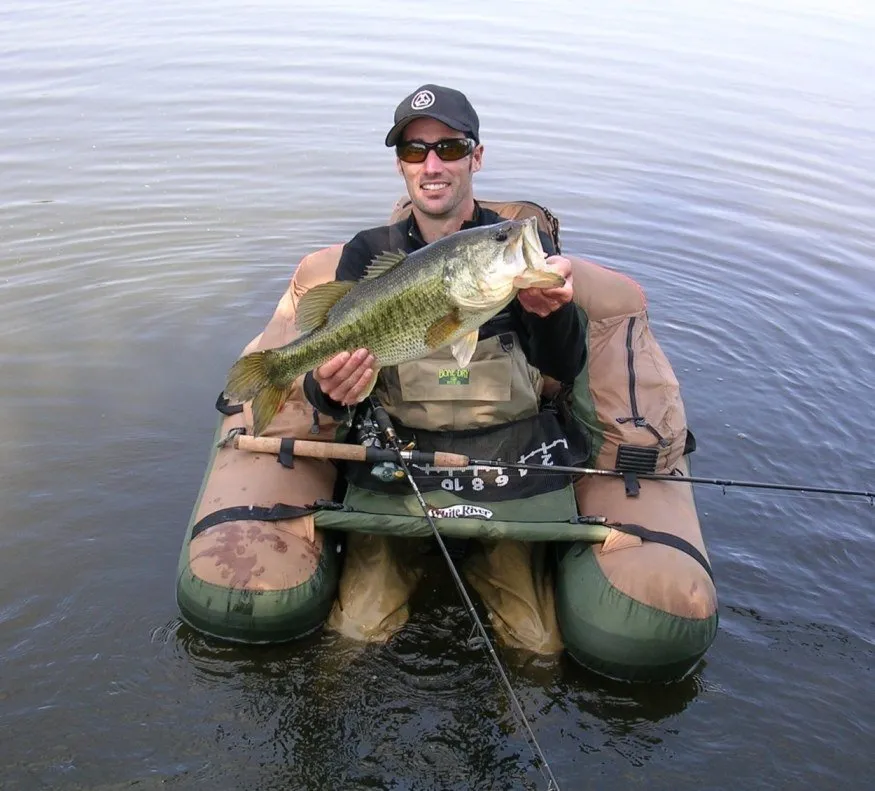
Soulcraft co-founder Matt Nyiri doing what he enjoys most, off the bike
Why did Matt move on from Soulcraft?
When we started out we were selling through bike shops and it was rough. Margins were slim and it was hard for two guys to make ends meet. We scraped by for our first couple years and met with (Swobo founder) Tim Parr to iron out a plan. He grilled us pretty hard about our vision and place in the industry, and the thing that came out of that discussion was selling direct, which set us into somewhat of a tailspin because Salsa always sold through dealers. Things were starting to change in the early 2000s. We had our website but needed to change with the times. It took someone like Tim to tell us what we needed to hear.
All Soulcraft production was stock stuff, which meant a lot of carrying charges for heavy inventory. I started thinking about doing everything custom, raising prices and saying 'yes' to customers. We basically changed our focus without changing our core business – making frames. Things started looking good and I was building 150 frames at that point, busting stuff out nearly seven days a week. I realised there was only so much I could build in a year ... [and] it would be really tough to provide a decent living for two people.
This was also the time when Surly, On-One and other Taiwan-made brands were creeping up on the radar. Matt and I agreed to split in 2005, and his skills allowed him to get a job at [US bike retailer] Cambria, then CamelBak., where he works now.
You and your wife Lainie became parents this December. How will that change things in your life?
Having a kid certainly tightens things up in my life! Just when you convince yourself that certain days are gone, you have to rethink things and consider some options. That's why I'm keen on expanding my horizons, and am becoming more open-minded. Like I mentioned earlier, I've never been a big gambler, and it might take some debt leverage, but I need to put things on paper to see if things could work.
I certainly don't want to spend too much time in the business without developing it. I have to be aware of keeping people stoked on the Soulcraft brand, but I need to keep it more cattle and less hat.*
For more information on Soulcraft, visit www.soulcraftbikes.com.
* 'All hat and no cattle' is an American phrase that means 'all talk and no substance'.

Salsa founder Ross Shafer (left), Black Mountain Cycles owner Mike Varley and Sean Walling
